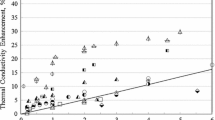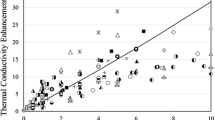Abstract
A two-dimensional analytical solution is derived for the three-omega method for measurement of thermal conductivity of materials with a fine wire. The analytical solution includes the wire heat capacity and the effect of heat losses from the ends of the wire. To derive the solution, finite Fourier transforms are applied in the direction parallel to the wire axis. The solution is compared with a one-dimensional solution and experimental data. It is found that heat losses from the wire ends have a significant effect on the 3ω components at low frequency and tend to be less important at high frequency. Moreover, it is shown that two-dimensional effects will be severe for nano-scale wires, even if the wire length-to-diameter ratio is very large.
Similar content being viewed by others
Abbreviations
- c p :
-
Heat capacity at constant pressure
- f :
-
Frequency
- I o :
-
Magnitude of the oscillating current
- K 0 :
-
Modified Bessel function of 0th order
- K 1 :
-
Modified Bessel function of 1st order
- K :
-
Kernel function
- l :
-
Length of the wire
- P o :
-
Time-average of power \({({=}I_{\rm o}^{2}R_{T}/2)}\)
- r 0 :
-
Radius of the wire
- r :
-
r-coordinate
- R T :
-
Resistance of the wire at temperature T + T 0
- R 0C :
-
Resistance of wire at 0 °C
- t :
-
Time
- T :
-
Temperature change relative to T 0
- \({\overline T_{n}}\) :
-
Fourier transform for temperature
- T avg :
-
Volume-averaged oscillation temperature component
- T 0 :
-
Initial temperature of the bath (°C)
- V Y :
-
Out-of-phase 3ω voltage component
- V X :
-
In-phase 3ω voltage component
- V fg3ω :
-
3ω voltage in function generator signal
- X :
-
Magnitude of 3ω voltage of in-phase component
- Y :
-
Magnitude of 3ω voltage of out-of-phase component
- z :
-
z-coordinate
- α s :
-
Thermal diffusivity of the sample
- β :
-
Temperature coefficient of resistance \({({=}({d}R_{T}/{d}T)\cdot R_{0{\rm C}}^{-1})}\)
- γ :
-
Euler’s constant (0.5772...)
- λ s :
-
Thermal conductivity of the sample
- λ w :
-
Thermal conductivity of the wire
- ρ :
-
Density
- ω :
-
Phase frequency (rad · s−1)
- avg:
-
Average
- gen:
-
Signal generator
- max:
-
Maximum
- min:
-
Minimum
- ref:
-
Reference resistor
- w:
-
Properties of the wire
References
Cahill D.G.: Rev. Sci. Instrum. 61, 802 (1990)
Cahill D.G.: Phys. Rev. B 50(9), 6077 (1994)
Wang Z.L., Tang D.W., Liu S., Zheng X.H., Araki A.: Int. J. Thermophys. 28, 1255 (2007)
Griesinger A., Heidemann W., Hahne E.: Int. Commun. Heat Mass Transfer 26, 451 (1999)
IAPWS (2008) Revised Release on the IAPS Formulation 1985 for the Thermal Conductivity of Ordinary Water Substance, http://www.iapws.org
Lu L., Yi W., Zhang D.L.: Rev. Sci. Instrum. 72, 2996 (2001)
Yi W., Lu L., Dian-lin Z., Pan Z.W., Xie S.S.: Phys. Rev. B 59, R9015 (1999)
E. Yusibani, P.L. Woodfield, M. Fujii, K. Shinzato, X. Zhang, Y. Takata, (Int. J. Thermophys. (2009), doi:10.1007/s10765-009-0563-09
Fujii M., Zhang X., Imaishi N., Fujiwara S., Sakamoto T.: Int. J. Thermophys. 18, 327 (1997)
Kakac S., Yener Y.: Heat Conduction, 2nd edn, pp. 267. Hemisphere Pub. Corp, Washington, DC (1985)
Author information
Authors and Affiliations
Corresponding author
Rights and permissions
About this article
Cite this article
Yusibani, E., Woodfield, P.L., Kohno, M. et al. End Effects in the Three-Omega Method to Measure Gas Thermal Conductivity. Int J Thermophys 30, 833–850 (2009). https://doi.org/10.1007/s10765-009-0572-8
Received:
Accepted:
Published:
Issue Date:
DOI: https://doi.org/10.1007/s10765-009-0572-8




